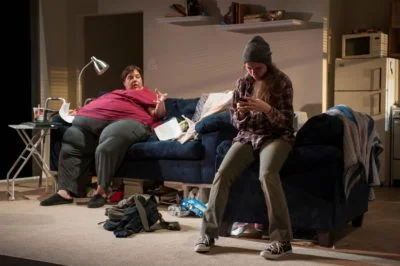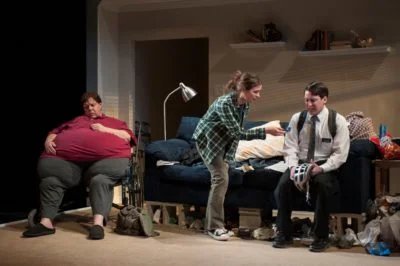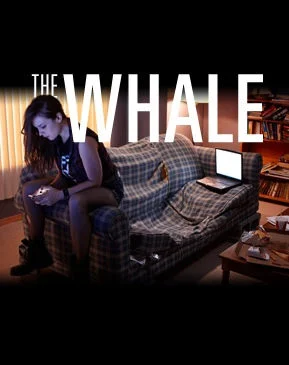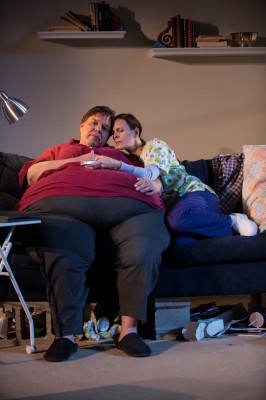The Whale
By Samuel D. Hunter
Directed by Joanie Schultz
Starring Will Allan, Dale Calandra, Cheryl Graeff, Patricia Kane & Leah Karpel
At Victory Gardens theater, Chicago
This probingly honest dramedy about the weight we carry receives a successful Midwest premiere.
At the risk of sounding mawkish, Samuel D. Hunter’s play The Whale—now making its Midwest premiere at Victory Gardens—isn’t about a morbidly obese 600-pound man effectively shackled to his living room couch. Not really. Rather, it’s about the man who’s living inside the 600-pound man. Now at a cursory glance, this sounds little better than a cheap platitude—a dopey equivalent of saying how real beauty’s “on the inside” or how beauty’s only “skin deep.” But that would be to reduce Hunter’s play to a greeting card cliché, which it most certainly is not.
No, Hunter thankfully has more respect for his audience, and he doesn’t shirk from showing how Charlie’s gross obesity is emulative of something equally pained within. Rather than making a martyr or a saint of Charlie (Dale Calandra), suffering at the hands of a society which has tragically failed to understand him—as in the vein of Bernard Pomerance’s 1977 play The Elephant Man—Hunter has wisely opted to pit Charlie against himself and to make of him his own worst enemy.
Why, for instance, does Charlie so adamantly refuse medical treatment for his impending congestive heart failure—a decision which, as his friend and nurse Liz (Cheryl Graeff) so forcefully reminds him, will lead inevitably to his death? With roughly $120,000 stashed away in a secret bank account, Charlie could afford the treatment if he so wishes. But Charlie insists that that money should go to his daughter, Ellie (Leah Karpel), whom Charlie has finally reached out to after fifteen years of estrangement.
But perhaps money isn’t the real reason Charlie foregoes treatment. The Whale’s frequent allusions to Herman Melville’s novel Moby-Dick suggest that lurking beneath Charlie’s immense surfaces is an almost Ahab-like obsession—driven from within—to strike dead his own cetacean monstrosity. Or perhaps Charlie feels as though he were himself the biblical prophet Jonah, swallowed by a whale, and now helplessly carried hence by a leviathan form he finds repulsive. Regardless, at the dark heart of The Whale is the portrait of prolonged suicide, never explicitly stated and perhaps only partially understood—even by Charlie.
Poignantly enough, Charlie’s boyfriend Allan endured a similarly excruciating fate—though much in reverse—having starved himself to death. Guilted by his local Mormon church into repudiating his love for Charlie, Allan was equally driven to wage a war against his body and his nature. This central tragedy was what initially led Charlie to overeat and to surrender himself over. And perhaps it’s also what led him to refuse the very idea of being saved—whether physically by his friend Liz or even spiritually by the young Elder Thomas (Will Allan), a renegade Mormon out on a mission from God.
Ironically enough, the only person in Charlie’s life who has no interest in saving him is his daughter Leah, a fledgling sociopath with a sharp-tongue who prefers to hurt others before they can hurt her. Leah’s own mother Mary (Patricia Kane) describes her as “evil,” which is precisely the kind of personal abandonment that Leah’s come to expect from people and which only exacerbates her cruel behavior.
Needless to say, Hunter’s The Whale is an emotionally potent tour de force, as unassuming in its characterizations as it is richly evocative in meaning. Still, on occasion Hunter’s dialogue hits the ear as too overly generalized—even hokey—when striving rather to be merely colloquial. And though white people in Idaho aren’t necessarily known for the poetic lyricism of their regional dialect, much of The Whale nonetheless sounds as though it were set in Anytown, U.S.A. The resulting effect is to tinge this otherwise shrewdly observed and scrupulously honest dramedy with the less illuminating hues of situational comedy—which if it does The Whale no harm, most certainly doesn’t do it any good either.
 Still, performances under Joanie Schultz’s patient and probing direction are sincerely heartfelt. Most notably, Dale Calandra as the gruff-voiced and breathless Charlie manages to rebuke the audience’s pity even as he courts their respect. Speaking from beneath a densely layered fat suit (a remarkable lifelike achievement by costume designer Janice Pytel), Calandra refuses to play Charlie’s obesity either for laughs or pathos, instead letting the face and the voice carry the weight, so to speak, of his character. The result is to make a clearly delineated human being emerge from layers of the grotesquely exaggerated.
Still, performances under Joanie Schultz’s patient and probing direction are sincerely heartfelt. Most notably, Dale Calandra as the gruff-voiced and breathless Charlie manages to rebuke the audience’s pity even as he courts their respect. Speaking from beneath a densely layered fat suit (a remarkable lifelike achievement by costume designer Janice Pytel), Calandra refuses to play Charlie’s obesity either for laughs or pathos, instead letting the face and the voice carry the weight, so to speak, of his character. The result is to make a clearly delineated human being emerge from layers of the grotesquely exaggerated.
Hunter, who has already built an impressive reputation out East, is one of Victory Garden’s newly appointed Ensemble Playwrights. Thus he’s set to participate in a seven-year residency right here in the Second City. Needless to say, should The Whale be an harbinger of more things to come, it’s going to be a good seven years.
RECOMMENDED
REVIEWED BY ANTHONY J. MANGINI
Reviewed Monday, April 15th, 2013.
Running time is approximately 1 hour and 50 minutes with no intermission.
The Whale runs until May 5th, 2013. Victory Gardens is located at 2433 N. Lincoln Ave. For tickets call the Victory Gardens box office at (773) 871-3000 or visit www.victorygardens.org. Check out their Theater in Chicago listing at https://www.theatreinchicago.com/the-whale/5490/.


